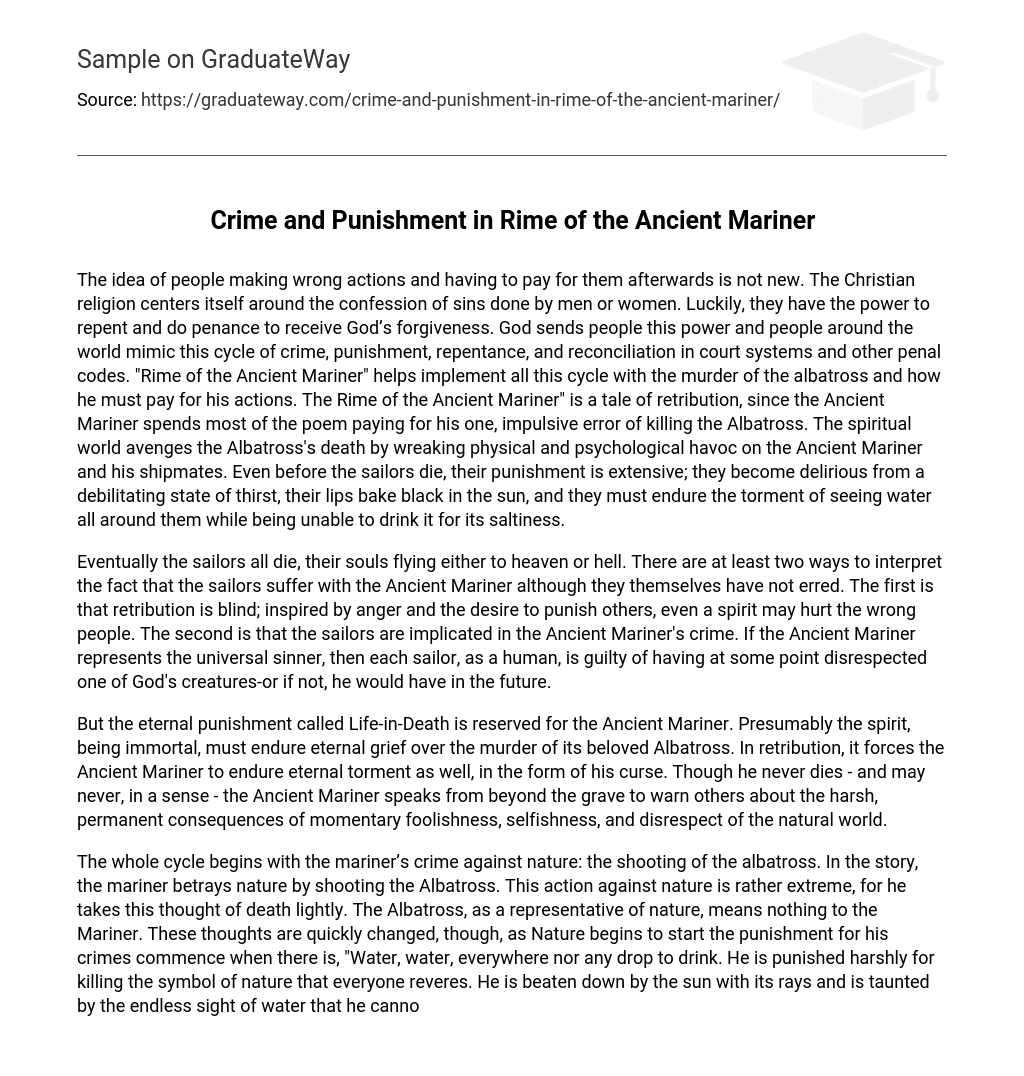The idea of people making wrong actions and having to pay for them afterwards is not new. The Christian religion centers itself around the confession of sins done by men or women. Luckily, they have the power to repent and do penance to receive God’s forgiveness. God sends people this power and people around the world mimic this cycle of crime, punishment, repentance, and reconciliation in court systems and other penal codes. “Rime of the Ancient Mariner” helps implement all this cycle with the murder of the albatross and how he must pay for his actions. The Rime of the Ancient Mariner” is a tale of retribution, since the Ancient Mariner spends most of the poem paying for his one, impulsive error of killing the Albatross. The spiritual world avenges the Albatross’s death by wreaking physical and psychological havoc on the Ancient Mariner and his shipmates. Even before the sailors die, their punishment is extensive; they become delirious from a debilitating state of thirst, their lips bake black in the sun, and they must endure the torment of seeing water all around them while being unable to drink it for its saltiness.
Eventually the sailors all die, their souls flying either to heaven or hell. There are at least two ways to interpret the fact that the sailors suffer with the Ancient Mariner although they themselves have not erred. The first is that retribution is blind; inspired by anger and the desire to punish others, even a spirit may hurt the wrong people. The second is that the sailors are implicated in the Ancient Mariner’s crime. If the Ancient Mariner represents the universal sinner, then each sailor, as a human, is guilty of having at some point disrespected one of God’s creatures-or if not, he would have in the future.
But the eternal punishment called Life-in-Death is reserved for the Ancient Mariner. Presumably the spirit, being immortal, must endure eternal grief over the murder of its beloved Albatross. In retribution, it forces the Ancient Mariner to endure eternal torment as well, in the form of his curse. Though he never dies – and may never, in a sense – the Ancient Mariner speaks from beyond the grave to warn others about the harsh, permanent consequences of momentary foolishness, selfishness, and disrespect of the natural world.
The whole cycle begins with the mariner’s crime against nature: the shooting of the albatross. In the story, the mariner betrays nature by shooting the Albatross. This action against nature is rather extreme, for he takes this thought of death lightly. The Albatross, as a representative of nature, means nothing to the Mariner. These thoughts are quickly changed, though, as Nature begins to start the punishment for his crimes commence when there is, “Water, water, everywhere nor any drop to drink. He is punished harshly for killing the symbol of nature that everyone reveres. He is beaten down by the sun with its rays and is taunted by the endless sight of water that he cannot drink. Nature is the force in this poem that has power to decide what is right or wrong and how to deal with the actions. The mariner reconciles his sins when he realizes what nature really is and what it means to him. All around his ship, he witnesses, “slimy things did crawl with legs upon the slimy sea” and he questions “the curse in the Dead man’s eyes”.
This shows his contempt for the creatures that Nature provides for all people. The mariner begins to find his salvation when he begins to look on the ‘slimy things’ as creatures of strange beauty. When “the mariner begins to find his salvation when he begins to look on the ‘slimy things’ as creatures of strange beauty” he understands the Albatross is a symbol of nature and he realizes what he had done wrong. The mariner is forgiven after sufficient penance. The mariner’s experience represents a renewal of the impulse of love towards other living things.
Once he reconciles his punishment is lifted. The bird, which is hung around his neck as a punishment, falls into the water and makes the change from punishment to penance. For the mariner to repent for his actions he must endure his penance. The mariner’s penance includes having his soul in agony soon afterwards. After attempts at prayer and realization of what he has done he “looked to heaven and tried to pray”, his penance to forgiveness begins. He must endure all of his friends being dead, and solitude on a boat that goes no where.
For his long term penance, he is doomed for the rest of his life to seek out certain people to tell his tale to because every so often his soul tortures him until does so. So, basically, his penance is to be messenger for the rest of his life that tells people, who need to know, his story to teach them the cycle he personally bears. Penance is a natural thing whether it is self-inflicted or given and must be one so one’s heart can be free of guilt. Crime, punishment, repentance, and reconciliation is evident in many things around the world.
They are an active part in society, and they decide the fate of many people. Some do not except their penance and are condemned. Others recognize what they have done wrong and do as much as they can to fix it. The mariner accepts his punishment and lives on with only the slight burden of telling a story rather than facing death. If people will realize their wrongs and try to correct them like the mariner life will be more peaceful and many will have a higher quality of life.





